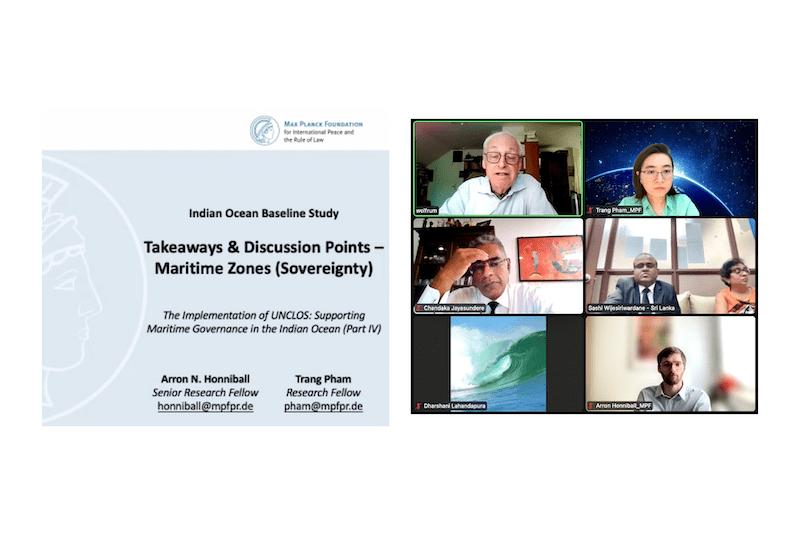The Foundation, cooperating with Sri Lanka’s Ministry of Foreign Affairs, host maritime zones workshop.
On 25 March 2022, The Foundation organised the first workshop in a series of planned activities aimed at presenting the main findings of the Indian Ocean Baseline Study to relevant stakeholders from Sri Lanka. The focus of this workshop was the objective analysis and findings concerning the maritime zones claimed by Sri Lanka and other Indian Ocean coastal states. Local participants were members of the Committee established to Upgrade National Maritime Laws, in relation to International Conventions, ratified and not ratified by Sri Lanka, who initially requested the presentation.
In cooperation with the Ocean Affairs, Environment & Climate Change Division of the Ministry of Foreign Affairs of Sri Lanka, and due to the ongoing COVID-19 pandemic and resulting restrictions on travel and gatherings, the workshop was conducted remotely via the Zoom platform. This represents the first workshop in a series of eight sessions with Sri Lankan stakeholders on selected topics of the law of the sea that will be delivered as part of the Supporting Maritime Governance in the Indian Ocean (Part IV) project, generously funded by the German Federal Foreign Office. The results and analysis contained in the Indian Ocean Baseline Study provides the foundation to initiate these open and inclusive discussions concerning consistencies, gaps, and opportunities in the regional implementation of UNCLOS into national law, with a focus on Sri Lanka.
S. Hasanthi Urugodawatte Dissanayake, Acting Additional Secretary, Ocean Affairs, Environment and Climate Change at the Ministry of Foreign Affairs of Sri Lanka, chaired the workshop, offering opening and closing remarks. Professor Rüdiger Wolfrum provided a presentation on the objectives of the Baseline Study and subsequent state practice as a means of interpretation of UNCLOS, including Sri Lankan practices. Research Fellows from the Foundation’s Asia Team then presented key takeaways from the comparative analysis of the maritime zones claimed by the 21 states covered in the Baseline Study. During the Q&A session an open discussion between members of the Committee and Foundation staff on a range of law of the sea issues ensued.
This workshop provided fruitful discussions on the findings of the Baseline Study concerning maritime zones, as well as the law of the sea more generally. The Foundation looks forward to continued cooperation with Sri Lanka across the range of activities forming the Supporting Maritime Governance in the Indian Ocean (Part IV) project. This includes the subsequent workshop sessions which will discuss the substantive ‘maritime matters’ chapters of the Baseline Study – matters which build on the maritime zones dialogue conducted during this kick-off webinar.

